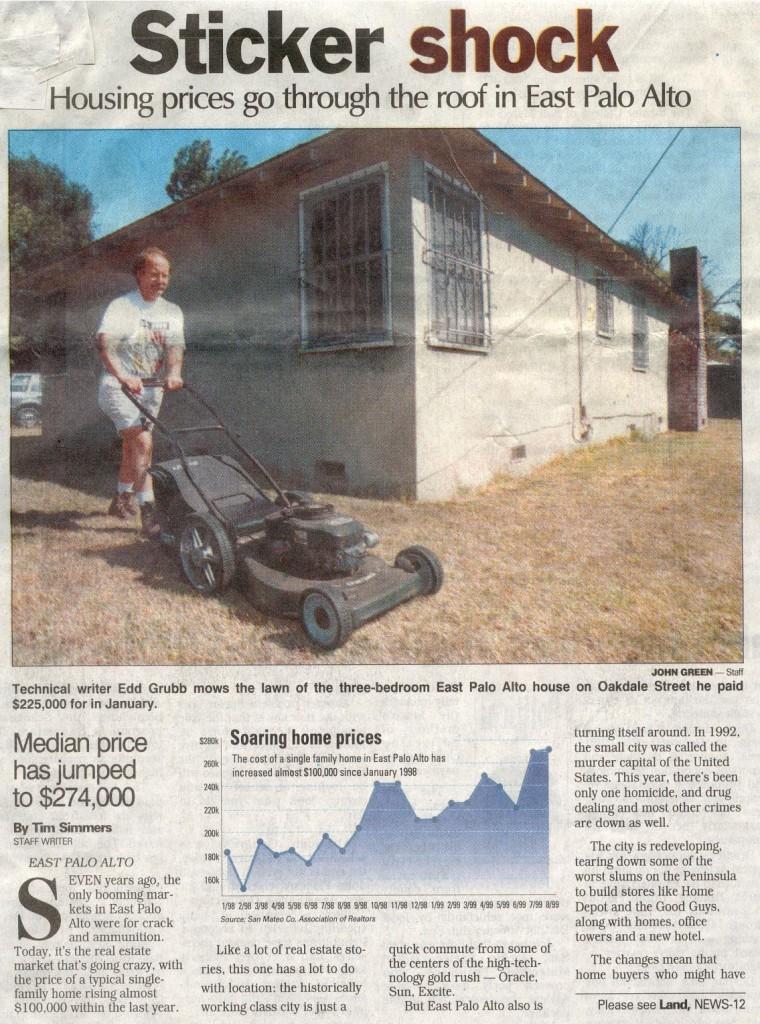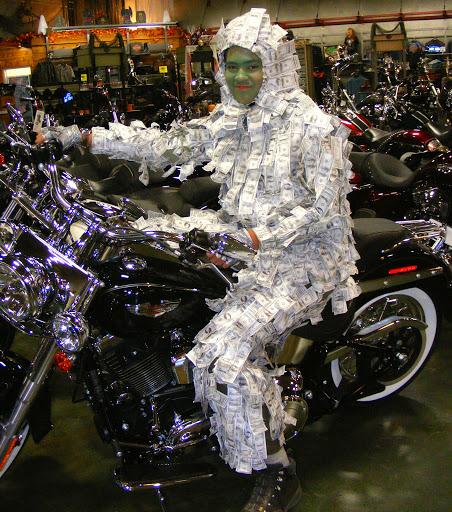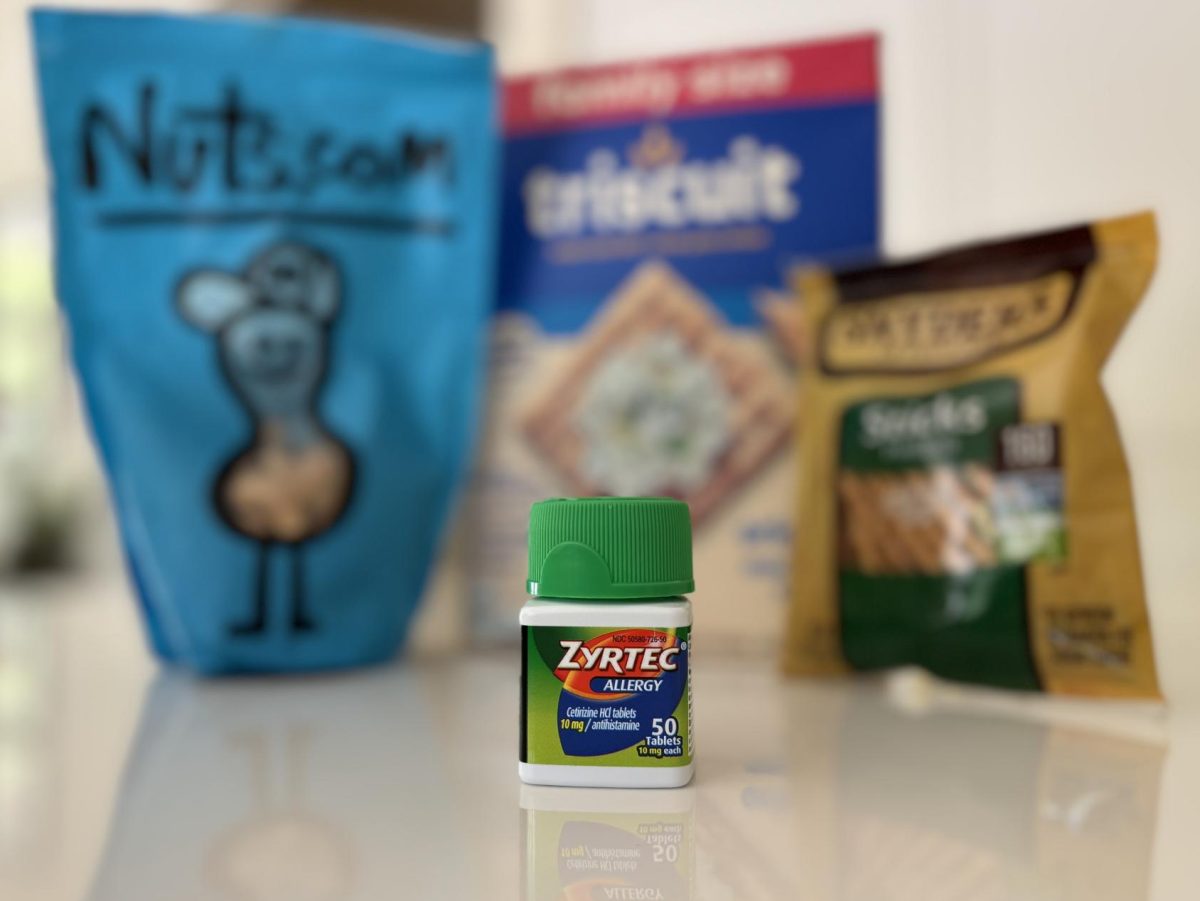[title type=”h5″]For incoming sophomore Pierre Grubb, the story of overcoming adversity is “when shit hits the fan, laugh at it.”[/title]
[divider type=””]
Pierre Grubb at our first interview in his house during the beginning of his freshman year. Used with permission from Emiliana Martín.
[dropcap1]W[/dropcap1]hen you first arrive at sophomore Pierre Grubb’s house, situated next to a large, peachy house with a Puerto Rican flag hanging proudly by its side, you would think that he’s just another upper middle class resident of Cupertino.
Except, he isn’t. He and his mother rent a 600 square foot area of the house that provides them with the bare necessities: one bedroom, one bathroom, one linen closet, and a living room combined with a kitchen. His older sister, who will remain anonymous on the basis of mental health issues, lives in a group home in Carmel, CA.
As Grubb lugs his rolling backpack around the MVHS campus, he looks like he’s just doing fine — like any other student, albeit a little peculiar with a slight stutter, his afro and the various hats he sported at the beginning of his freshman year. But he hasn’t been fine since 2006, the day he turned seven years old — the day his father, Edd Grubb, passed away from medullary thyroid cancer.
He hasn’t been fine since then. But that’s not what he’ll tell you.
Despite that day having been one of the most critical turning points in his life so far, he barely remembers much of that day, or any day before that.
“The only thing that I remember about my dad is that I stuck to him like glue. That’s it,” Grubb said.
The same cannot be said for his mother.
“I had my last, most intimate moments with my husband,” Emiliana Martín wrote in her blog. “I told him how much he meant to me. I whispered in his ear something like: ‘Thank you Edd. Thank you for saying ‘I do’ to me. I never thought any man would love me but you did and you did it well.’”
[title type=”h6″]The father he should’ve known[/title]

Far from what the situation is like today, the past seems almost idyllic by comparison — when Martín, her husband and their two children lived together under one roof.
One of her husband’s most distinctive characteristics was his love for the outdoors, which he endowed to the rest of his family. In addition to being the Eagle Scout for his son’s Boy Scout troop, he also took the family up Half Dome in Yosemite National Park and many other parks .
An adventurer, “he loved living on the edge,” Martín wrote in an email to El Estoque. When buying their first home together, the couple decided to live in East Palo Alto due to limited financial options.
“As a woman of color, my family of origin did everything they could to ensure we never had to live in the ‘hood.’ They emerged from it and didn’t want us to regress,” Martín wrote. “My husband was proud of [living in East Palo Alto] while I did everything I could not to mention where I lived.”
Whenever she was asked, Martín would say that she lived in Palo Alto. Meanwhile, there was a photo of her husband mowing his lawn in the San Mateo Times.
But the most notable of all his attributes are the ones reflected in the son who barely knew him.
“[Pierre] demonstrates a lot of his father’s personality without even knowing it,” Martín wrote. “Edd Grubb was a super friendly guy with a golden heart the size of Texas. He loved big and always had room to love more regardless of their station in life. Edd used to say to me, ‘Did I tell you how much I love you today?’ which melted my heart. He regularly gave away items to homeless people. He absolutely was legit.”
[title type=”h6″]A birthday and a funeral[/title]
A rare type of cancer, medullary thyroid cancer “comprises 3% to 4% of all thyroid cancers,” according to the National Cancer Institute. When the cancer began taking a tighter hold on his life, Edd would bathe multiple times a day, keep all the lights on downstairs and would stay awake because “he wanted to live as much as he possibly could before he died,” according to Martín.
And as his life entered the final stages while Grubb’s just began his first few, Martín frantically called hospice and family members from Maui to New York.
“Hospice confirmed my worst fear. This is the final stage of death,” she wrote in her blog about the experience last year. “It’s our son’s seventh birthday. He won’t be able to sing [his son] one more happy birthday song.”
Excused from school, the children were informed of their father’s condition and each said their final goodbyes to him.
“My son had a birthday party scheduled for that night and I was determined to make sure it happened anyway,” she wrote. “Life goes on and so would we just for that day. I made sure [my son] knew we would celebrate his birthday with his friends anyway … and we did.”
After quickly discussing the final details of the funeral with her brother-in-law, Martín said her last few words to her husband:
“I love everything about you even when you made it hard to love you … You have my permission to let go of this life. You did good, babe. I’m proud to have known you. My life is better because you were in it. I’ll be here with you when you go.”
That evening, Grubb and his friends ate ice cream and cake while playing video games as the other parents helped around with the party. After the guests left, the reality caved in for Grubb.
“Later that night it hit [my son] like a ton of bricks and his body wasn’t cooperating,” Martín wrote in her blog.
Martín and her children slept in the same bed with all the doors locked and the lights turned off.
“When I awoke the next morning, all of the lights were on downstairs as if Edd was home again. I double-checked with the kids. No one had been downstairs yet and I don’t sleepwalk. I knew it had to be Edd, so I chose to believe it was him.”
Edd Grubb ascending Half Dome in Yosemite National Park with his family. It was his last backpacking trip. Used with permission from Emiliana Martín.
[title type=”h6″]“The perfect storm”[/title]
The already fragile situation took a turn for the worst when his sister, whom Grubb describes as “sweet to the point where it’s almost annoying,” began to have mental breakdowns when her brother was barely eight-years-old. The family, which by then had already settled in Sunnyvale, tried to carry on, but things came to a head during what should’ve been a relaxing vacation in Maui shortly after Martín’s late husband passed away in 2007.
“[She] stepped out of the balcony of the hotel room,” Grubb said. “I think it was like she didn’t want to come back in, so Mom closed the door on her and she stood on the rail telling anyone who would listen about how mean we are to her, or whatever, and basically threatened to jump and we had to get her off the rails. Oh my God, it was ridiculous.”
This incident that sent off red flags, coupled with the fact that Martín became unsatisfied with how the FUHSD was handling her condition, her daughter was placed in several boarding schools in Utah and Tennessee, visiting her family four times a year for three years. After graduating at age 19, she came back to live with her mother and brother, both hoping for some normalcy.
But according to Martín, subsequent episodes of mental breakdowns caused her parents, to sue her for custody of her daughter in 2007.
According to Grubb, the family that wasn’t really close to begin with now didn’t see each other at all outside of courthouse visits, which became the norm for three years. It was especially hard for Martín. Already finding it difficult adjusting as a single parent, she had a hard time explaining to her children why they couldn’t see the rest of their family anymore.
With all the subsequent obstacles that the family had to face, the money from her husband’s retirement account quickly dwindled. According to Grubb, the money should have lasted family well after he reached adulthood.
“[My sister] was one of the things that sucked the money out of us, along with the lawsuit and the economic crash of 2008. [It was] the perfect storm,” he said.
Despite all that has happened, Grubb says that there’s little of the past he would change.
“I don’t regret having her as my sister. [She’s] crazy but she’s my crazy sister, not anyone else’s crazy sister.”
According to him, his sister, who is eight years older, does remember a lot more about their father, making her one of the few people today who can tell him about Edd Grubb.
[title type=”h6″]The storm’s aftermath[/title]

Eleven years ago when Grubb turned four years old, the family moved from their home in East Palo Alto and into a house in Sunnyvale, where Grubb remembers the happiest days of his childhood.
“It was a really nice house,” he said. “It was like one building and four houses and we had the largest lot. I love that house, it was so great.”
Grubb, who is set on becoming a successful actor, plans to purchase the entire lot someday, assuming that the house is still standing — so he can use his future to buy back the past.
For now, the place that they rent will have to suffice. Although adjusting to their cramped living space after living in their 1600-square-foot house in Sunnyvale posed another obstacle, Grubb’s family counts it as a blessing.
After all the expenditures which resulted in a crippling financial status, she found it hard to move out and find another place to live:
“I was getting nervous as our move-out date was approaching with no prospects in sight and lots of rejections behind.”
When she finally found a small property that she was able to afford, she had little hope of renting the place but was encouraged to apply by the realtor after explaining her situation.
So far, they have not missed a single payment.
“That was clearly evidence of God working on our behalf,” Martín wrote. “That rent check has been a miracle every month ever since.”
According to Martín, who goes to church every Sunday with her son, Christian values and a good sense of humor have been their saviors in the healing process. She especially adheres to Hebrews 13:5, which says “[Jesus] will never leave you nor forsake you.”
“Mom likes to say, ‘When shit hits the fan, laugh at it,’” Grubb said. “That’s what we try to do. Often. The world’s a funny place — you can’t take it too seriously.”
Both are trying whatever they can to avoid pessimism. Although he hasn’t told any of his friends about his family’s situation, even during the court battles, he claims that his friends have helped him regardless.
“I would’ve been a pessimist,” he said. “I would probably have been a lot meaner if I didn’t have those people around me to think about … It’s a lot easier if you have friends, that’s definitely a true statement.
Presently, Martin is on disability due to Post-traumatic stress disorder after working in public relations. She also finds solace in writing a blog that chronicles her struggles.
And although Grubb understands that he must move on, there are times where he can’t help but look back into the past and ask “what if?”
“Lately I’ve been thinking what would life be like if dad were still alive … He would be working. Mom would be under much much less stress, so Mom could also be working potentially … If it was within our grasp, we would’ve moved to Cupertino so I can go to Homestead [High School] because I have a lot of friends going to Homestead. I don’t know if we would still be in the court trial thing.”
Nonetheless, he’s still fully aware of his situation:
“It’s me and Mom versus the world. Mostly Mom versus the world.”
[title type=”h6″]Another day, another year[/title]
As the days inched towards the start of summer vacation, Grubb, like so many other students, is no longer a freshman.
Citing MV SNL, the green show and “all the acting” as the highlights of the year, he is excited about taking Advanced Drama next year as a sophomore.
“Doing SNL was one of the best decisions I’ve ever made,” he said excitedly in a rare light moment of the interview. “There was nothing, absolutely nothing negative that came out of it … Oh man, all the people there were really nice.”
Perhaps the biggest difference between him and other students his age is that although he is happy now, he is not naïve. After a long silence upon being asked what he’s learned from the court battles, he replied that nobody’s perfect — but that you can’t used that as an excuse:
“You really shouldn’t do certain things because the things that you do will impact other people ridiculously more than you think.”
Nonetheless, when asked about how to deal with familial problems, he had an contrasting, forgiving response:
“No matter what happens, love all of them. No matter how much they hate you, love them … You know, if you kind of demonstrate love on them then it kind of gets them thinking, ‘There’s something about that guy. Why is he so happy?’”
Exiting their home and closing the side yard door you entered earlier, you see a sign hanging at the entrance: “Other things may change us, but we start and end with family.”

An earlier version of this story contained private information that has since been removed.
Updated on July 1 at 10:46 pm: This article was updated to omit private information and include additional clarifying information.





















